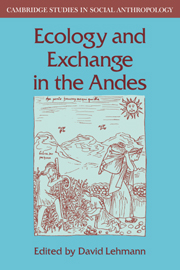Book contents
- Frontmatter
- Contents
- List of contributors
- Acknowledgements
- The Andean region: relief
- The Andrean region showing ecological levels (after Troll 1968)
- 1 Introduction: Andean societies and the theory of peasant economy
- 2 The role of the Andean ayllu in the reproduction of the petty commodity regime in Northern Potosí (Bolivia)
- 3 Labour and produce in an ethnic economy, Northern Potosi, Bolivia
- 4 ‘Resistance to capitalism’ in the Peruvian Andes
- 5 Production and market exchange in peasant economies: the case of the southern highlands in Peru
- 6 The Andean economic system and capitalism
- 7 Property and ideology: a regional oligarchy in the Central Andes in the nineteenth century
- 8 Multi-levelled Andean society and market exchange: the case of Yucay (Peru)
- Glossary
- References
- Index
- Cambridge Studies in Social Anthropology
6 - The Andean economic system and capitalism
Published online by Cambridge University Press: 29 September 2009
- Frontmatter
- Contents
- List of contributors
- Acknowledgements
- The Andean region: relief
- The Andrean region showing ecological levels (after Troll 1968)
- 1 Introduction: Andean societies and the theory of peasant economy
- 2 The role of the Andean ayllu in the reproduction of the petty commodity regime in Northern Potosí (Bolivia)
- 3 Labour and produce in an ethnic economy, Northern Potosi, Bolivia
- 4 ‘Resistance to capitalism’ in the Peruvian Andes
- 5 Production and market exchange in peasant economies: the case of the southern highlands in Peru
- 6 The Andean economic system and capitalism
- 7 Property and ideology: a regional oligarchy in the Central Andes in the nineteenth century
- 8 Multi-levelled Andean society and market exchange: the case of Yucay (Peru)
- Glossary
- References
- Index
- Cambridge Studies in Social Anthropology
Summary
Introduction
The central assertion in this chapter is that peasant economic relationships in some areas of the Peruvian Andes, at least at present, cannot be considered as a specific economic system, distinct from the capitalist mode of production. The assumption upon which this argument rests is that the so-called Andean peasant economy lacks the means of its own reproduction and, instead, peasant activities obey more the laws and logic of the wider capitalist system with which they are integrated.
Anthropological studies have argued that the notions and practices of reciprocity, among others, constitute the regulating mechanism of Andean economic relationships. This belief has led specialists to suggest the persistence of a qualitatively distinct system which interacts with an alien and dominant system, that is, capitalism. In attempting a critical examination of this approach we will discuss the regulative role of this principle. It will be argued that the persistence of some practices which accord with such a principle is not associated with the existence of a specific economy; rather, it is the product of the determining effects of economic and political forces pertaining to the rules and development of the capitalist system. The principles of Andean culture, as subordinated ideological concepts, merely fulfil the role of legitimizing such relationships.
- Type
- Chapter
- Information
- Ecology and Exchange in the Andes , pp. 157 - 190Publisher: Cambridge University PressPrint publication year: 1982
- 9
- Cited by



